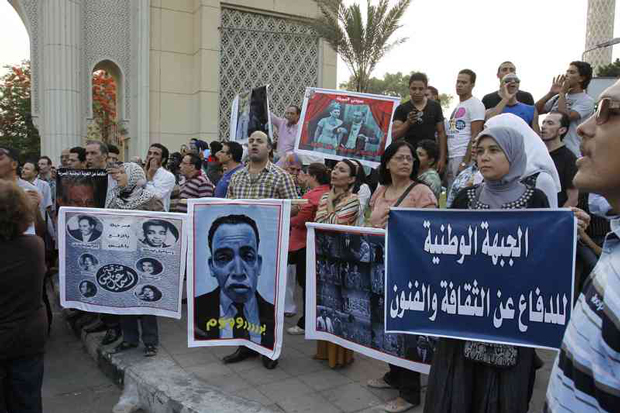28 Jun 2013 | Middle East and North Africa

Egyptian intellectuals hold posters and the Tamarod (Rebellion) petitions while chanting slogans during a demonstration against the Minister of Culture Alaa Abdel Aziz, in front of the opera house in Cairo. (Photo: Mohamed Elmaymony / Demotix)
Tensions have been building up in Egypt ahead of mass protests called for by opposition activists on 30 June, the date marking the first anniversary of Islamist President Mohamed Morsi’s inauguration. Shahira Amin reports on the growing concerns for free expression
A sit in by a group of Egyptian filmmakers, writers, performers and intellectuals — which has continued for the past two weeks outside Cairo’s Ministry of Culture — is seen as a prelude to the bigger anti-Muslim Brotherhood protests planned for Sunday. The mass demonstrations are being called for by “Tamarod” (Rebellious), a nationwide campaign launched by members of the opposition Kefaya to collect signatures from Egyptians for a vote of no confidence in the Islamist President. Organizers of the campaign recently announced that they have succeeded in gathering 15 million signatures.
Meanwhile, the arts protesters outside the ministry are demanding the removal of Egypt’s new Islamist minister of culture Alaa Abdel Aziz and protesting what they claim are efforts by the Islamist government to “Ikhwanize” the arts. Ikhwanize is an Arabic word which literally means the appointment of members of the Muslim Brotherhood in key positions in state institutions.
The protesters have been using peaceful means to hammer home their message including poetry recitals, performances and raising placards with anti-Muslim Brotherhood slogans.
Skirmishes broke out briefly last week after the peaceful rally was attacked by Islamist supporters of President Morsi who chanted pro-Muslim Brotherhood slogans and demanded that the minister purge the ministry of old regime remnants. Several protesters were injured in rock throwing incidents and assaults by the Islamist demonstrators before riot police intervened.
The protesters began their sit in after Abdel Aziz dismissed several cultural figures including the directors of the General Egyptian Book Organization, the Cairo Opera House and the National Library and Archives. These firings fueled fears that the expulsions were a first step to stifling artistic expression in the country by placing conservative Islamists at the helm of these institutions.
In a press statement released earlier this month, the Abdel Aziz defended the dismissals as a “campaign against corruption” which he said was a necessary step to purge the ministry of corrupt elements and halt embezzlement of public funds by greedy individuals. The cast of Opera Aida retaliated by appearing on stage with anti-Muslim Bortherhood placards and chants calling for the downfall of the Morsi regime.
Today on Index
Lords criticise Stormont delay on libel reform | Turkey must end attempts to limit free speech | Free speech roundup: Bahrain edition | Free expression in the news
The sackings followed controversial statements made earlier this month by conservative Salafist MP Gamal Hamed who criticized ballet as the “art of nudity” during a televised parliamentary session. His statements sparked concerns that ballet performances may be banned under the Islamist government. In recent months, some ultra-conservative Salafis have condemned the display of statues, insisting that depiction of the human body in paintings or sculpture is “frowned upon in Islam.” Such statements have stirred controversy, triggering an outcry by Egyptian liberals and intellectuals who are growing increasingly concerned that the rising wave of conservatism sweeping the country threatens the thousands of statues in museums and historic temples.
“Such statements pose a very real threat tp our ancient heritage as they may incite violent attacks by Islamist zealots on our monuments, “ said Maged Farrag, a liberal collector of royal artifacts.
In a move hailed as a victory by Egypt’s liberals and intellectuals, Mahmoud Abdulla, a controversial Salafi TV preacher who insulted Egyptian actress Elham Shaheen on his TV show on the religious Satellite Channel El Nas, has recently been sentenced to three years in prison and ordered to pay a fine. He had said that Shaheen would “never see the gates of Heaven because of her indecent roles on screen”. He stands to be imprisoned after his appeal was rejected by a court earlier this month.
Egypt’s liberals and intellectuals, however, are becoming increasingly concerned about what they describe as persistent attacks on creativity and artistic expression under Islamist rule. Many of them fear that the Islamist government is determined to alter Egypt’s cultural identity. In a column published earlier this month by state-sponsored Al Ahram, Khaled Fahmy, chairman of the history department at the American University in Cairo, explained that attempts by the Muslim Brotherhood to exercise control over the arts and culture were based on their conviction that Egypt’s identity “had been hijacked by the West and that the time had come for the country to regain its Islamic identity.”
The ministry of culture protesters have turned down an invitation for dialogue extended by President Morsi, who has promised to listen to their demands and concerns. They have vowed not to budge until Abdel Aziz is replaced.
“Egypt is not a privately-owned farm to be divided among the President’s loyalists as reward for their allegiance”, the Freedom of Creativity Front, a coalition of artists supporting the sit-in, said in a statement released earlier this month.
With just days to go before the mass protests demanding the downfall of the President and the Muslim Brotherhood group from which he hails, more opposition activists are joining the ministry of culture sit in on a daily basis.
It appears certain that the ministry building will be one front where the secular-Islamist battle will be fought out.
18 Jun 2013 | Egypt, Middle East and North Africa, News and features

Photo: Shutterstock
A proposed bill in Egypt outlawing violence against women has now been proposed by the country’s National Council for Women. But is it a step forward in tackling the silence around sexual harassment in the country? Shahira Amin reports
Egypt’s National Council for Women (NCW) has submitted a draft law addressing all forms of violence against women to the Shura or Consultative Council, the country’s lower house of parliament.
The proposed law would criminalise violence against women, including forced marriage, trafficking, female genital mutilation, and sexual harassment in its many forms. The law also includes provisions encouraging victims to report incidents of harassment and assault, while ensuring their protection.
The draft came at the request of Prime Minister Hisham Qandeel, after a rise in the number and intensity of sexual assaults at protests. The violence peaked earlier this year, when 25 female protesters were the victims of mob violence and sexual assault during protests in Tahrir Square on the second anniversary of the 2011 mass uprising.
Sexual harassment is a daily reality for the majority of Egyptian women: a UN report released April 2013 estimated that 99 per cent of Egyptian women have been subjected to some form of harassment.
If passed, the law will be a step towards addressing Egypt’s crippling culture of self-censorship around violence against women.
Social stigma around sexual assault and rape has been a barrier in speaking out in Egypt’s conservative society, but this taboo has been actively challenged since the fall of former President Hosni Mubarak more than two years ago.
“Because a girl’s chastity is linked to family honour, women were either too ashamed to report the incidents to the police for fear of being stigmatised or they blamed themselves for causing the harassment or assault believing it may have happened because they were not dressed modestly enough or were out at a late hour,” explained Nehad Abou Komsan, head of the Egyptian Center for Women’s Rights.
“With the fear barrier gone and in the freer post-revolution environment however, more women are coming forward to report assault or rape incidents. That is the positive change that the revolution has brought: the silence has been broken,” she told Index. The provision guaranteeing protection for witnesses to assault incidents will also encourage them to come forward with their testimonies instead of turning a blind eye to such incidents, she added.
Egypt has seen a surge in violence against women post-revolution, sparking a more emboldened movement against sexual harassment, which some have alleged to be politically motivated. Movements like Tahrir Bodyguard and Harassmap have formed in order to address and speak out against sexual harassment. Women have been more vocal in speaking out in the media, and giving graphic accounts of their experiences.
NGO Nazra for Feminist Studies has explained the surge in violence against women post-revolution as “a continuation of the ousted regime’s policies and part of attempts by the various security agencies and the remnants of the former regime to keep women away from the public sphere.”
While rights campaigners hail the draft law on violence against women as “a major step in the right direction”, they say legislation alone will not end violence.
Fatma Khafagy, NCW ombudsman said that “what is needed is a change in the mindset of both women and men. Men have to learn to respect women as equal partners in society, while women have to realise that they should not tolerate violence in any form”, said Khafagy. Changing attitudes will take time, she noted, adding that “what is important is that the process has started .”
While rights advocates hail the bill as “timely”, they fear that the Islamist-dominated Shura Council may block the bill on the grounds that it may be seen as violating Sharia or Islamic law.
In March this year, the Muslim Brotherhood issued a controversial statement during this year’s Commission on the Status of Women (CSW) rejecting the document drafted on eliminating violence against women, saying that it included articles that “contradict the principles of Islam and destroy its ethics”.
The Muslim Brotherhood’s stance was quickly condemned by the NCW.
5 Jun 2013 | Egypt
A campaign called ‘Tamarod’ has already gathered millions of signatures calling for the ousting of Egyptian president Mohamed Morsi. Shahira Amin reports on the growing discontent with the country’s first post-revolution president
A campaign titled ‘Tamarod’ (the Arabic word for rebellion), calling for the fall of President Mohamed Morsi, is quickly gaining momentum in Egypt. The brainchild of the country’s ‘Kefaya’ (which means enough in Arabic) movement — the petition calling for Morsi’s ouster has had more than 7.5 million signatures to date. The campaign’s organisers say they hope to gather 15 million signatures by 30 June, the first anniversary of Morsi’s inauguration. They have also called for a mass protest in front of the Ittihadeya Presidential Palace the same day, in efforts to pressure Morsi into stepping down from the presidency and call for early presidential elections.
Scores of youth volunteers have been standing on busy street corners in Cairo’s affluent Zamalek and Mohandesseen neighbourhoods, urging commuters to sign the petition highlighting Morsi’s failure to deliver on his campaign promises of improving the economy, narrowing the country’s economic divide, and restoring security on the streets. Curious drivers and pedestrians stop to read the leaflets, bringing traffic to a standstill as supporters of the campaign chant anti-government slogans, and flash victory signs.
“The response to the campaign has been overwhelming . Egyptians are growing increasingly frustrated with the faltering economy , soaring prices of basic commodities, the fragile security situation and persistent power cuts, ” said Naglaa Bakr, a Mohandesseen resident and housewife, who had just signed the petition. “Morsi has to go”, she added.
The popular movement has now begun to draw support different factions in Egypt’s fractured opposition. As the campaign picks up steam, members of the Egyptian Federation of Trade Unions, the Dostour (Arabic for constitution) Party, the Social Democratic Party, the Free Egyptians, the 6 April youth movement, and the Journalists’ Syndicate have lent their support.
Morsi, meanwhile, appears to be unthreatened by the initiative, saying that he “welcomes free expression as long as it is within a legal framework.” Prominent Muslim Brotherhood member Mohamed Al Betaguy dismissed the campaign as an “opinion poll”, and cast doubt on whether or not the organisers could turn the petition into mobilisation. The Salafi Al Nour party has also slammed the initiative, calling it “illegal and unconstitutional.”
TODAY ON INDEX
Violence against Muslims on the rise in Burma |
Free expression in the news | Turkey losing its way on free speech
INDEX EVENTS
Caught in the web: how free are we online?
The internet: free open space, wild wild west, or totalitarian state? However you view the web, in today’s world it is bringing both opportunities and threats for free expression. 10 June. More information
In response to Tamarod, Morsi’s Islamist supporters have launched their own campaign called ‘Tagarod’ — the Arabic word for impartiality. Tagarod’s leaders say that theirs is “an initiative to support legitimacy”, accusing Tamarod of aiming to destabilise the country and spread chaos. Tagarod’s founder, Assem Abdel Maged, is confident that his campaign would garner more signatures than those of Tamarod. Abdel Maged, who is also a member of the Jama’a Islamiya group, aims to use his own petition to prove that there are more Egyptians rallying behind the Islamist President than his opponents. The Tagarod campaign has also vowed to organise a million-man march to show solidarity with Morsi.
“The campaigns accentuate the secular-Islamist divide in the deeply polarised country. Tensions are building up ahead of protests planned for 30 June”, said Hadia Abdul Fattah, a Tamarod campaign member, who has been gathering signatures in the northeastern city of Damietta.
In recent weeks, several members of the Tamarod campaign have faced detention for distributing the petition on or near university campuses in Cairo, Sohag, and Zagazig. The targeted campaigners were forced to sign documents stating that they would no longer distribute Tamarod petitions, or take part in political activities on campus. In March, the Supreme Council of Universities banned political activities on campuses, under the pretence of ending violence between different political groups.
Some have warned that a crackdown on the movement could spark the kind of civil unrest that Morsi has been trying to avoid. Opposition activists say they will no longer tolerate any kind of repression, and vow to continue to protest until their demands are met.
Even if the campaign fails to reach its 15 million signature goal, activist and human rights lawyer Tarek Moawad told Index that the initiative highlights the crisis of legitimacy facing Morsi, and sends a clear message that Egyptians will not be silent about injustice. Morsi’s usage of Mubarak-era tactics to silence critics — whether it’s targeting journalists or the green light given to Islamist supporters attacking opposition activists — is a sign of the government’s weakness and vulnerability, he added.
Some analysts have also suggested that Egypt’s liberal opposition could use Tamarod to their advantage, by galvanising support for the liberal opposition in the upcoming parliamentary elections in October.
“If the political opposition can close ranks and adopt a unified stance, Tamarod may have the potential to boost gains for the secularist opposition which has so far failed to organise,” said Dr. Mostafa Kamel El Sayed, Professor of Political Science at Cairo University.
28 May 2013 | Middle East and North Africa

Teacher Dimyana Abdel Nour faces blasphemy charges
An Egyptian Christian primary school teacher has gone into hiding after pupils accused her of blasphemy. Shahira Amin reports.
(more…)



